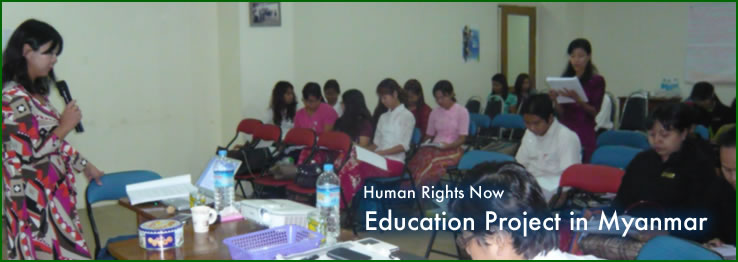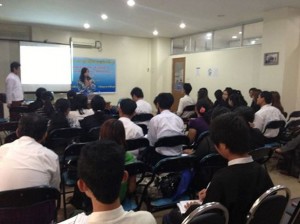
HRN has started human-rights education project in Myanmar from February, 2014. Associated with “Yangon Bar Association”, a group of over 3,000 bar members, it started as a project for education of Burmese lawyers about internationally established safeguards for human rights such as “the Universal Declaration of Human Rights”.
From 2009 to 2013, on the Thai side of Thailand-Myanmar border, HRN operated “Peace Law Academy”, a law school to develop Myanmar’s future lawyers and community leaders, and sent lawyers and UN staff from Japan as lecturers on human rights and the rule of law including international human rights law. It produced a number of graduates, many of whom now taking the lead in democratization after returning to Myanmar. (Learn more about our previous project, Peace Law Academy: )
HRN came to launch human-right projects in Myanmar in the wake of recent progress of democratization. In February, 2014, HRN’s Secretary General Kazuko Ito conducted a 4-day-seminar, with nearly 100 participants, on the Universal Declaration of Human Rights in Yangon Bar Association , which was the first opportunity to learn the Declaration for the participants.
In Myanmar, under the military dictatorship for 25 consecutive years, speaking about human rights had involved danger of arrest and/or punishment, and free speech itself including education on human rights had been suppressed. Also, because organizations without permission of the military government were perceived as illegal, many bar associations were put in illegal status. However, as democratization progressed, free speech came to be recognized to a certain level, and discussion of human rights that would not have been permitted before has relatively developed, which enabled the bar associations to take steps forward in human rights activities. In response to all the progress, HRN’s project is to provide trainings and contribute even a little to the great success of the lawyers who will bear a part in human rights activities in the future.
In the seminar in February, 2014, there were lectures and discussions on the Declaration and the utilization of UN human rights mechanisms for four days.
“Which human rights are internationally guaranteed?”
“What responsibility do the States hold?”
“To what extent limitation of human rights is possible, and in what case it is not permitted?”
We caught a glimpse of the actual situation in which while these questions above remained not accurately understood in legal sense, many lawyers were standing up against everyday violations of human rights. The seminar provided detailed explanations on what provisions were violated and why it could be called human rights violation for each case and issue to the lawyers who would report unjust human rights violations occurring across the country with his hand up, and ask, “is this a violation of human rights guaranteed in the Declaration?” showing righteous anger.
The Constitution of Myanmar does not fully guarantees human rights. This is why we would like them to acquire accurate knowledge about internationally established human rights safeguards, use them effectively, and advance protection of human rights. Our education project is meaningful and greatly important in this light. We strongly felt ourselves responsible for our educational activities.
HRN intends to continue conducting trainings and seminars of human rights education for lawyers acting for human rights. It will not be limited to Yangon in the future, but will be extended to provincial cities. We also plan to response to the needs of human rights education for women’s groups, youth, and ethnic minorities.

(About Human Rights Now) Human Rights Now is an international human rights NGO based in Tokyo, Japan, and its members comprise mainly lawyers, scholars, journalists, and etc, working for the improvement of the situations of human rights violation beyond national boundaries.
Human Rights Now is an NGO that has UN special consultative status, acting to improve situations of serious human rights violations across the world, operating fact finding missions, and advocating to the UN and other stakeholders. At the same time, we place emphasis on empowerment, that is the grass-roots level of human rights education activities and capacity building. This is based on our belief that people who live there are the actors in changing the situation of human rights in that country. Human Rights Now will continue to support people living in those countries can themselves play an active role in improving the situation. This project is built upon the support from private donators. Please support our activities.
For details of our activities, see our website: http://hrn.or.jp/
Secretary General’s book
「人権は国境を越えて」
https://www.iwanami.co.jp/.BOOKS/50/2/5007560.html
View recent interviews:
http://hrn.or.jp/activity/media/post-269/
http://hrn.or.jp/activity/media/newsjan35/



